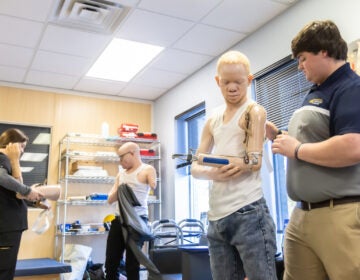Stockton University president resigns over Showboat fiasco

Stockton University purchased the now closed Showboat casino.
On the heels of a raging controversy over Stockton University’s plan to build a campus on the Atlantic City boardwalk university President Herman Saatkamp announced his resignation, effective September 1.
Saatkamp, who has been president of the school for more than a decade, sent his resignation to Stockton’s board of trustees privately on Tuesday, in a letter in which he explained that he’d primarily stayed in his post this long to oversee the foundation of the so-called Island Campus in Atlantic City. But ever since he spearheaded the purchase of the bankrupt Showboat casino on December 12, 2014, the project — which could end up costing the public university more than $26 million — has been beset with so many problems that its future is uncertain at best. Trustees have resigned. Students are railing against a plan to sell the building to a man who made racist remarks.
The latest complaint comes from the faculty. Despite Saatkamp’s resignation, they’re still considering issuing a nonbinding statement of condemnation for what they consider his rushing into the purchase of the Showboat without enough transparency.
The Island Campus
Stockton has tried to expand major operations into Atlantic City, 13 miles away from its main campus in Galloway, six times since Saatkamp began serving as president 12 years ago. The university is outgrowing its current facilities in Galloway and at several other regional locations. And by earning its designation as a “university,” rather than a “college,” last winter, Stockton maintains that it needs larger facilities and more opportunities designed to attract a high-level 21st century student.
Plans for a campus at the Showboat facility, if Stockton does somehow manage to achieve its vision, are very large indeed. Stockton would move its sizable tourism and hospitality program to Atlantic City, and students will help run an onsite, for-profit hotel that houses a restaurant and shops. The building would contain 852 dorm rooms, parking, dining, recreation, classroom and performance space, and meeting rooms and workforce-training areas for the community.
In the new building, Stockton would have room to grow many of its academic programs. It would immediately move its dance, music, and theater classes. The university’s orchestra-in-residence could come over, too, to take advantage of a prominent Boardwalk performance location. Marketing materials proclaim the value of locating the school in a central, high-profile spot to raise its visibility and place students near decisionmakers who can offer them internships and jobs.
The university would also create the Stockton Center to house existing facilties like the Lloyd D. Levenson Institute for Gaming Hospitality and Tourism and the William J. Hughes Center for Public Policy. Within two years, students should be able to complete graduate and undergraduate degrees there in subjects like health sciences, business, and criminal justice. Administrators are also contemplating a new Urban Studies program and myriad educational resources for the community.
They estimate the campus will service 4,000 students — half the current student body — within 10 years. They hope to eventually add student-services offices like financial aid so that students won’t need to travel back and forth to Galloway to take care of their administrative errands.
Stockton says it’s far less expensive and time-consuming to renovate the Showboat than to build a new facility. It also says the building was purchased with money from the school’s investment fund, without any new debt or state appropriations. Tuition will not be affected.
Administrators also plan to work with public officials to develop a “University Park” neighborhood around the campus to serve the needs of students and jumpstart economic revitalization in that part of the struggling city. University press releases speak fervently of the Island Campus’s ability to add desperately needed nongaming activities to boost the city’s fortunes while it finds a way to redefine itself in a post-gambling-monopoly world.
But in buying Showboat out of bankruptcy for $18 million, Saatkamp and the trustees made a critical mistake: They ignored a legal agreement signed by the casino’s previous owner that stipulated the building could not be used for anything but a high-end casino-hotel. When Trump Entertainment, the other signatory to the agreement notified Stockton earlier this year that it planned to enforce it, university and city officials set about to rezone the parcel for academic use. But even if the rezoning is approved, it’s sure to face a protracted court battle that Stockton can’t afford to wait out. Earlier this month, Saatkamp wrote a mournful open letter to the community in which he lamented that he may have to sell the building.
A few days later, Florida real estate mogul Glenn Straub, who just bought the bankrupt Revel casino, quietly made a deal to rescue Stockton by buying Showboat, if necessary. The deal gives Stockton an 18-month right-of-first-refusal to buy back the Showboat or lease it from Straub, if the mogul decides to resell or lease it.
But Straub is facing a multitude of his own troubles at Revel and, in frustration, is threatening to abandon Atlantic City. Even if he stays and makes good on his promises, he’ll have to work hard to win over Stockton stakeholders who didn’t appreciate him wishing aloud for students to staff Revel who are “free, white and over 21.”
Saatkamp will stay through at least August 31 to guide the school through the next few months, as the situation in Atlantic City plays out. In his resignation letter to trustees, obtained by NJ Spotlight, he mentioned health issues and “the demands I expect of myself from the office.” He called himself “optimistic for the success of the Island Campus in spite of the challenges currently faced.”
The university issued a statement yesterday congratulating him on his many accomplishments, though it’s likely this incident will tarnish his legacy. He leaves too many questions in his wake, including how could he and trustees make such a critical miscalculation and why would they want to build a college campus on the Atlantic City Boardwalk in the first place.
The Covenant
In 1988, Caesars Entertainment, which owned Showboat until its sale to Stockton in December, signed a legal agreement, called a “covenant,” with Trump Entertainment that guaranteed the Showboat will only be used as a casino-hotel. Until a few months ago, Trump Entertainment, which is no longer affiliated with Donald Trump, owned the Trump Taj Mahal, which (literally, as well as figuratively) stands between Showboat and Revel. Somehow, according to Saatkamp, Caesars assured Stockton that it had resolved the covenant with Trump and Stockton proceeded to buy the building. In its sales contract was a contingency that Caesars would indemnify Stockton in the off chance that Taj’s owners decided to enforce the terms of the covenant.
Once Stockton had bought the building, Taj announced that it would block the former casino’s conversion to a campus. By then, Caesars had declared bankruptcy at some of its properties across the country, including Caesars and Bally’s in Atlantic City and only a judge can authorize the corporation to pay any legal bills Stockton incurs.
The investment team that took over management of the bankrupt Taj’s assets last year is led by notoriously difficult billionaire Carl Icahn. Under his direction, Taj said it’s open to a university in Atlantic City, just not next door. “Having kids under 21 who will attempt to gain entry to the casino and engage in activities reserved for those only 21 and older would create numerous problems,” Taj wrote in a statement.
But two of Atlantic City’s elected state officials — Sen. Jim Whelan (D-Atlantic City) and Assemblyman Vincent Mazzeo (D-Atlantic City) – say they wish Icahn, a newcomer to the area, would play nice.
“The Taj Mahal has been in town 30-plus years (yet) … it seems Mr. Icahn doesn’t really want to work with anybody,” Mazzeo said. Stockton CEO for External Affairs and Institutional Research Sharon Schulman says the university has met with Trump Entertainment representatives several times to negotiate a compromise and that Stockton officials are readying paperwork to bid out design and construction contracts in the hopes that it can open the campus this fall.
However, as Saatkamp wrote in a statement in early April, “We cannot afford to just hold this building with no incoming revenues while the two casinos play their own gamesmanship.” Calls to the Taj were not returned and a spokesperson for Caesars declined to comment.
The City
Attempting to work around the covenant, Atlantic City officials have drafted new zoning ordinances to prohibit a casino from operating at Showboat. Such a move would clear the way for Stockton to run its operations. Mazzeo calls the ordinance a game-changer for economic development around Showboat.
“Having a college campus … makes for a different type of clientele,” he said. “(Any) development would go hand-in-hand with a college lifestyle. You’d see some type of social component: parks, bars, dance clubs.”
But Taj promises to block the attempt to circumvent it for the same reasons as above. On April 9, city council indefinitely tabled a final vote on the proposal.
The Savior
On April 7, Glenn Straub finally succeeded in purchasing the bankrupt Revel for $82 million, after several failed tries. The following week, Straub, who’s floated the idea of establishing a “university of the future” inside Revel, quietly bought Showboat from Saatkamp to keep Stockton from potentially taking a loss in a sale on the open market. According to the arrangement, Straub put $26 million into an escrow account for 90 days while he waits on Stockton to decide if it does, in fact, want to complete the sale. That amount covers the $18 million Stockton paid to buy Showboat, plus the costs the school has incurred to maintain the building in the months since.
If Stockton can’t work out the covenant and/or rezoning issue within 90 days and proceeds with the sale to Straub, the school has an 18-month right-of-first-refusal to lease or buy back the building. The arrangement forms part of what Straub and Stockton are calling the “Phoenix Project.” The $500 million, 8-part project aims to turn Revel and sweeping swaths of Atlantic City into sports and nongaming entertainment attractions, with investment from Straub.
But Straub is making a lot of enemies in Atlantic City, and they seem to be souring him on his ambitions to redevelop and reanimate parts of the floundering city. For starters, he’s refusing to pay the rates demanded by ACR Energy Partners, the company that supplies electricity exclusively to Revel. While the matter unfolds in court, Straub is paying $5,000 daily in fines to let the empty building sit dark rather than enlist ACR’s services.
What does this have to do with Stockton? A few things. To power Revel for the next few years, Straub wants to siphon electricity from Showboat. Saatkamp signed off on that plan, agreeing to sell Straub any energy the building can spare. In the meantime, Straub anticipates laying the infrastructure required to hook Revel up to the city’s primary grid, which is owned by Atlantic City Electric.
But ACR released a statement last week challenging Straub’s legal ability to bypass the city’s sanctioned power suppliers and claiming a public university can’t simply decide to double as a utility. The stress is clearly getting to Straub, who was, until a few days ago, fighting Revel-related court battles on several fronts.
Last Thursday, both Whelan and Mazzeo said they’d heard chatter about the mogul threatening to let Revel sit idle for the next three years, and the following day, The Inquirer reported Straub saying that if he can’t find a favorable solution, he’ll strip the Revel, tear it down and sell the property. Neither comment could be independently confirmed. Multiple calls to Straub’s Polo North Country Club and his attorney were not returned
The Protest
Straub isn’t making many friends on campus, either. Students have held at least two protests to challenge the university’s relationship with the developer. They’re angry at his remarks that hospitality students could train to be night clerks at Revel and that his ideal student would be “white, free and over 21.”
Published accounts say Straub apologized for his insensitive remarks and said that his lack of formal education had left him crude, inarticulate, and afraid of speaking in front of large groups. Stockton External Affairs CEO Schulman says she’s thrilled that Stockton students are expressing their beliefs.
We encourage our students to be civically engaged,” she said. “It’s something we’re rather proud of.”
Before Straub got involved, students also protested in favor of the campus – marching at Showboat to send a message to Taj managers to drop their enforcement of the covenant.
The Process
The faculty senate and union passed a resolution last Thursday to request two seats on the board of trustees because they find it unfathomable that Saatkamp and trustees bought the Showboat despite the covenant. Faculty senate President-elect Brian Tyrrell said nine days passed between the closed board session where Saatkamp presented the purchase plan and the day he actually bought it. In that time, board members called a special (open) meeting to take public comment and vote. According to Tyrrell, no one mentioned the covenant.
“We need to ensure that a situation like this doesn’t arise again,” he said.
Faculty only found out about the covenant after Taj threatened to enforce it. Now that Saatkamp and trustees have voted to quickly and quietly sell the building without discussing the matter with faculty, the senate is taking this week to determine whether they’ll formally condemn the president and whether it’s worth announcing their decision now that he’s leaving. The statement would be issued to the board but wouldn’t, itself, carry any consequences. The process has also led to the resignation of two former trustees – one in December and one a few days ago.
Stockton News and Media Relations Director Maryjane Briant said the school had no comment on the faculty or trustee actions.
_________________________________________________
NJ Spotlight, an independent online news service on issues critical to New Jersey, makes its in-depth reporting available to NewsWorks.
WHYY is your source for fact-based, in-depth journalism and information. As a nonprofit organization, we rely on financial support from readers like you. Please give today.




